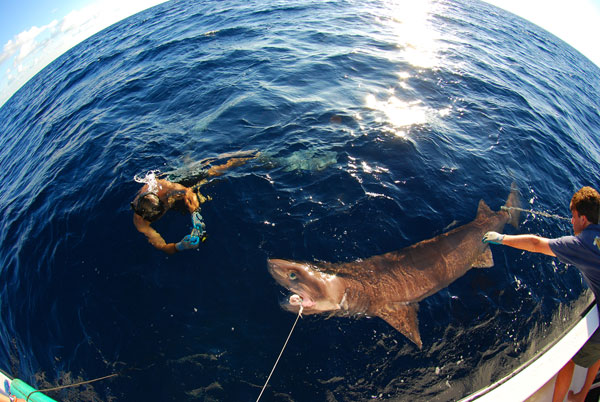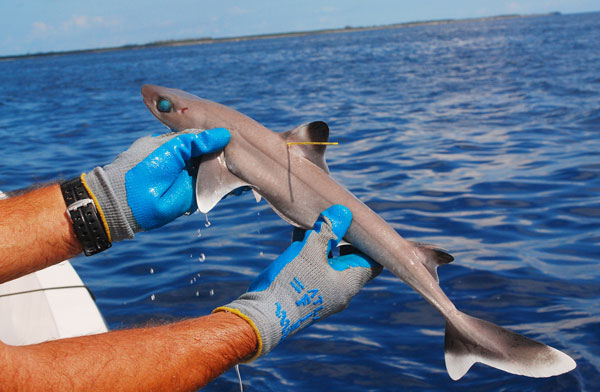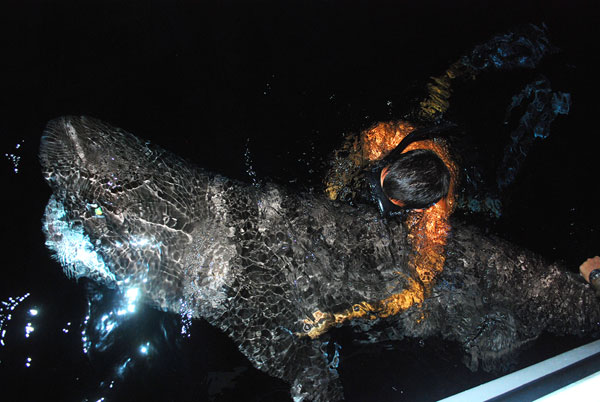|
From:TheBahamasWeekly.com Local
Cape Eleuthera, The Bahamas - The Shark Research and Conservation Program at the Cape Eleuthera Institute initiated a new research program this week aimed at investigating the diversity and abundance of deep ocean sharks living in The Bahamas. Collaborating scientists Dr. Dean Grubbs of Florida State University, Dr. Demian Chapman of Stony Brook University, and Lucy Howey-Jordan of Microwave Telemetry, Inc. traveled to the Cape Eleuthera Institute to get the project started and encountered an incredible degree of success. Over the course of three days and six surveys, the team captured 25 animals from six different species. These ranged from a 389 cm (13 ft) bluntnose sixgill shark to a 47 cm (18 inch) fully grown sawtail catshark. “I have conducted research on deep water sharks in a number of locations around the world including the central Pacific off Hawaii, the temperate western Atlantic off the east coast of the USA and in the Gulf of Mexico. Cape Eleuthera appeared to be an ideal location to expand my research however I never expected the incredible diversity and abundance of species we encountered these last few days. Twenty-five sharks from six different species on only six surveys is an incredible record.” said Dr. Dean Grubbs. Of all the currently described species of sharks, 256, or 56%, live their entire lives below 200m (660ft) of water. Of these species, basic information about life history is available for only five species, and information relating to movement patterns is available for only three species. Until recently these deep-water environments acted as a refuge from human exploitation, however, as stocks of fish closer to the ocean surface are subjected to overfishing, commercial interests are turning their attention to the deep. Many of these deep-water sharks are being exploited without any understanding of their biology and ecology on which to base management decisions. “The particular highlight for me was in fact the smallest shark we captured, a Springer’s sawtail catshark. This species was only described in 1998 and there are relatively few records of it anywhere in the world so I am incredibly excited to encounter it in Eleuthera,” said Dr. Dean Grubbs. This project is providing a unique educational experience for students from The Island School who, alongside staff from the Shark Research and Conservation Program, will continue to gather data over the coming weeks. “This is an incredibly exciting new project for the Shark Research and Conservation Program. We have been working on the more easily accessible sharks such as the Caribbean reef, tiger and nurse sharks for over three years now, yet we had no idea of the treasure-trove of new species that were right on our door step. The first phase of this project has been a huge success and I cannot wait to see the rest of the data we gather over the course of the next 12 weeks with the Island School students. These students are incredibly lucky as there are very few people who have ever seen most of the species they will be working with this semester - it’s a truly unique opportunity for them,” said Edd Brooks, Program Manager of the Shark Research and Conservation Program at the Cape Eleuthera Institute.
In addition to monitoring the diversity and abundance of the animals encountered, the research team will be utilizing some of newest electronic tracking technology available to monitor these animals’ movements. So far three pop-up satellite archival transmitters (PSATs), which record depth, temperature and light level data which is later transmitted to a satellite, manufactured by Microwave Telemetry, Inc., have been deployed on bluntnose six gill sharks to compliment the 10 already deployed on this species by Dr. Grubbs in Hawaii, the eastern United States and the Gulf of Mexico. A further five will be deployed on gulper sharks over the coming weeks providing the first movement and habitat use data for these animals. Until the recent development of the X-tag there was not a PSAT small enough to deploy on a smaller species like the gulper shark. “The new X-Tags deployed on these sharks will provide some of the highest resolution tracking data currently on the market. I am really excited to be working with the team at the Cape Eleuthera Institute because the facilities and proximity to deep water provides an excellent opportunity to study the movement and behavior of deep-water sharks,” said Lucy Howey-Jordan of Microwave Telemetry, Inc. Dr. Demian Chapman, the Assistant Director of Science at the Institute for Ocean Conservation Science based at Stony Brook University, who studies shark genetics and conservation, was especially impressed with the abundance of sixgill sharks. “These sharks have been around since well before the dinosaurs and yet we really don’t know that much about them. Captures of two sixgill species, including both adults and juveniles, suggests that much can be learned about this group here in The Bahamas. Once again the Bahamas is proving itself to be the ‘Shark Capital of the World’,” said Dr. Demian Chapman. The Bahamas is widely credited as being a leader in shark conservation after banning longline fishing in the late 1990s. The opportunity to study the wide variety of species that exists here, both in deep and shallow water, in a relatively un-disturbed state is one that has put The Bahamas on the map for shark researchers around the world. As ever the Shark Research and Conservation Program is indebted to the Bahamian Government’s Department of Marine Resources for providing permission for this research to be undertaken.
“The
absence of a commercial fishery of any significance for sharks in The
Bahamas, along a wide variety of marine habitats within close proximity
to the facility makes the Cape Eleuthera Institute an ideal location for
the pursuit of research into the these important species.
This exciting new direction of shark research will continue to investigate and explore the deep-water inhabitants of the Bahamas and provide much needed information on this minimally studied area of the world’s oceans. Given the resounding success of the project to date, it is likely that the deep-water shark research program will be a permanent fixture of the Cape Eleuthera Institute’s Shark Research and Conservation Program.
Institutional Information: The Island School: The Island School is a three-month semester leadership program for high school students. Participants have come from over 300 schools to study the tropical marine environment and take place-based courses in math, history, English, and art. The Cape Eleuthera Institute is a marine research facility that works with universities to model sustainable systems and find solutions for resource management. www.islandschool.org Cape Eleuthera Institute: Cape Eleuthera Institute is a marine field station situated on Cape Eleuthera, Eleuthera The Bahamas. It undertakes research on local environmental issues as well as acting as a host facility for marine and terrestrial scientists and visiting education groups of all ages. Cape Eleuthera Institute has especially focussed on developing new methods of resource use and management applicable to the Caribbean, such as effective use of solar energy and local recycling of waste organic and other materials. Its sister organisation, The Island School (www.islandschool.org), is a semester abroad program for high school students from the US and The Bahamas, for whom the Cape Eleuthera Institute provides hands-on research experience through their in house research programs. These programs include shark research, flats ecology and conservation, patch reef ecology and sustainable offshore aquaculture. www.ceibahamas.org
Florida State University Coastal and Marine Laboratory : FSUCML is a research and educational facility on a relatively pristine stretch of Florida’s Gulf coast approximately 100 km south of the FSU main campus in Tallahassee. The mission of the FSUCML is to conduct innovative, interdisciplinary research focused on the coastal and marine ecosystems of the northeastern Gulf of Mexico and beyond, with a focus on solving the ecological problems faced by the region by providing the scientific underpinnings for informed policy decisions. Permanent faculty and graduate students conduct field and laboratory-based research on taxa ranging from seagrasses to sharks. Ongoing projects at FSUCML include studies of habitat use and connectivity, genetic diversity, species life histories, food web dynamics, and fisheries ecology. www.marinelab.fsu.edu Stony Brook University Institute for Ocean Conservation Science: The Institute for Ocean Conservation Science is dedicated to advancing ocean conservation through science. We conduct world-class scientific research that increases knowledge about critical threats to oceans and their inhabitants, provides the foundation for smarter ocean policy, and establishes new frameworks for improved ocean conservation. www.oceanconservationscience.org Microwave Telemetry, Inc.: Located in Columbia, Maryland, Microwave Telemetry, Inc. has been providing satellite-tracking technology for avian and marine scientists for over 20 years. Research using their technology has aided in the conservation and management of dozens of species worldwide. For more information, visit their website at www.microwavetelemetry.com
|



